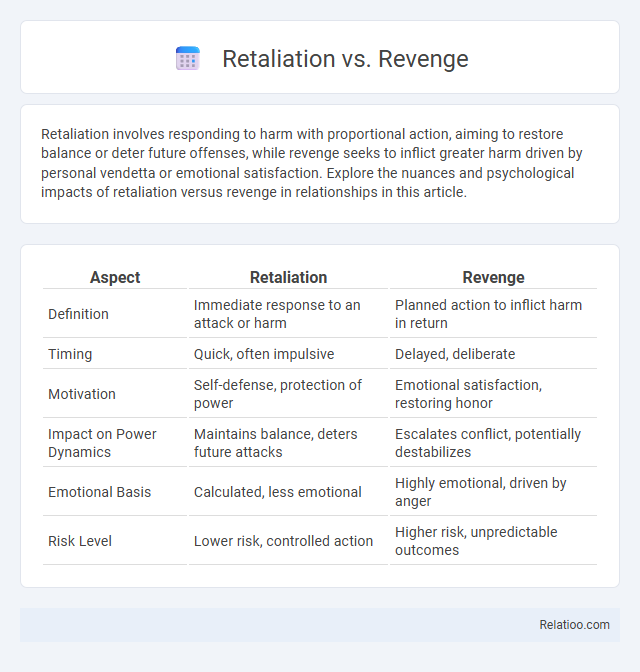Retaliation involves responding to harm with proportional action, aiming to restore balance or deter future offenses, while revenge seeks to inflict greater harm driven by personal vendetta or emotional satisfaction. Explore the nuances and psychological impacts of retaliation versus revenge in relationships in this article.
Table of Comparison
| Aspect | Retaliation | Revenge |
|---|---|---|
| Definition | Immediate response to an attack or harm | Planned action to inflict harm in return |
| Timing | Quick, often impulsive | Delayed, deliberate |
| Motivation | Self-defense, protection of power | Emotional satisfaction, restoring honor |
| Impact on Power Dynamics | Maintains balance, deters future attacks | Escalates conflict, potentially destabilizes |
| Emotional Basis | Calculated, less emotional | Highly emotional, driven by anger |
| Risk Level | Lower risk, controlled action | Higher risk, unpredictable outcomes |
Understanding Retaliation and Revenge
Retaliation involves responding to a perceived wrong with equivalent action, often guided by a sense of justice or self-defense, while revenge is driven by personal anger and a desire to cause harm beyond mere redress. Understanding retaliation and revenge highlights that retaliation tends to be more measured and situationally appropriate, whereas revenge is emotional and disproportionately destructive. Your ability to distinguish between these responses can help manage conflicts more effectively and avoid escalating tensions.
Key Differences Between Retaliation and Revenge
Retaliation involves responding to a specific wrong or harm with a proportional action, often driven by a desire for justice or defense, while revenge seeks to inflict harm with an emotional focus on personal satisfaction and bitterness. The key difference lies in retaliation's goal to restore balance or deter future offenses, compared to revenge's aim to punish and escalate conflict. Understanding these distinctions helps you manage conflict responses constructively and avoid destructive cycles.
Historical Perspectives on Retaliation vs Revenge
Historical perspectives on retaliation and revenge reveal distinct social and legal implications; retaliation often refers to a formalized response sanctioned by laws or codes, such as the ancient Hammurabi Code's lex talionis, which mandated proportional punishment to maintain order. Revenge, in contrast, typically embodies personal or emotional acts driven by passion and social grievances, often leading to cycles of violence without legal authority, as seen in vendettas or blood feuds throughout history. Understanding this distinction helps elucidate how societies transitioned from personal vendettas to institutionalized justice systems to curb endless retribution.
Psychological Motivations Behind Each Action
Retaliation often stems from a desire to restore balance and protect personal boundaries after harm, driven by immediate emotional responses such as anger or fear. Revenge is motivated by deeper psychological needs for justice and self-worth, frequently fueled by lingering resentment and the need to assert control over perceived injustices. Understanding your psychological motivations behind these actions can help manage emotional responses and foster healthier conflict resolution strategies.
Ethical Implications of Retaliation and Revenge
Retaliation involves responding to a perceived wrong with proportional action, while revenge often seeks personal satisfaction through excessive harm, raising significant ethical concerns. Revenge can perpetuate cycles of violence and injustice, whereas ethical retaliation aims to restore balance and uphold fairness without escalating conflict. Understanding these distinctions helps you navigate responses to wrongdoing with moral integrity and avoid actions that compromise ethical standards.
Retaliation in Legal and Social Contexts
Retaliation in legal contexts involves adverse actions taken against individuals for engaging in legally protected activities, such as whistleblowing or filing discrimination complaints, which is prohibited under laws like Title VII of the Civil Rights Act. Socially, retaliation often manifests as reciprocal harm or punishment following perceived wrongs, impacting interpersonal relationships and community dynamics. Understanding retaliation's distinction from revenge--which is driven by personal vengeance--and retribution--which focuses on justice--clarifies its role in upholding legal protections and social order.
The Role of Emotion in Retaliatory and Revengeful Acts
Retaliation often arises from a calculated response to perceived harm, whereas revenge is deeply driven by intense emotions such as anger and humiliation, fueling a desire for retribution beyond immediate justice. Your emotional state plays a crucial role in differentiating these actions, with retaliation linked more to strategic defense and revenge to emotional catharsis. Understanding these nuances helps manage responses and avoid escalating conflicts through uncontrolled emotional impulses.
Consequences and Impact on Relationships
Retaliation often involves a calculated response to harm that can escalate conflicts and damage trust, while revenge is driven by emotional impulses, potentially leading to long-lasting hostility and broken relationships. Unlike both, retribution typically aligns with justice and legal frameworks, aiming to restore balance without personal vendettas, although it may still affect social dynamics. Understanding these distinctions highlights the importance of managing responses to harm to preserve relationships and minimize negative consequences.
Strategies to Address and Prevent Revenge
Strategies to address and prevent revenge focus on promoting open communication and conflict resolution techniques that de-escalate tensions and foster understanding among parties. You can implement restorative justice practices and encourage empathy to break cycles of retaliation, ensuring long-term peace and collaboration. Building supportive environments where grievances are acknowledged and constructively addressed reduces the impulse for revenge and its harmful consequences.
Promoting Constructive Conflict Resolution
Retaliation, revenge, and retribution often intertwine, but constructive conflict resolution emphasizes addressing disputes through communication and understanding rather than escalating harm. Fostering empathy and seeking mutually beneficial solutions helps break cycles of retaliation and Revenge, promoting long-term peace and cooperation. Implementing restorative justice practices enables parties to acknowledge harm, take responsibility, and collaboratively repair relationships.

Infographic: Retaliation vs Revenge
 relatioo.com
relatioo.com